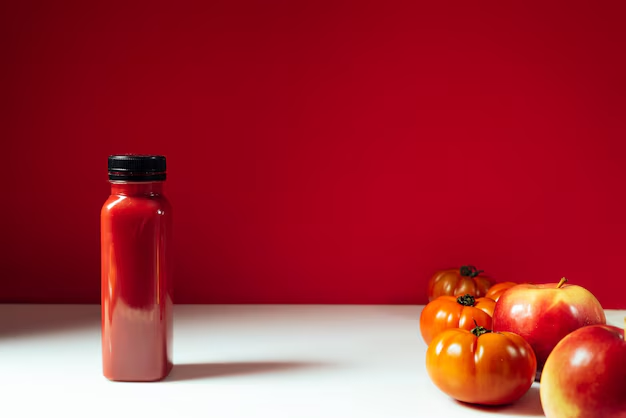How Long Does Your Ketchup Last in the Fridge? All You Need to Know!
Let’s talk about something almost everyone has in their fridge: ketchup. Whether it’s the crucial companion for your fries, burgers, or chicken nuggets, understanding how long ketchup stays fresh is an essential piece of your food storage puzzle. After all, nobody wants to dip into a stale or spoiled condiment. Dive with us into the delicious world of ketchup to uncover how long this pantry staple can last in your refrigerator and highlight some best practices for storage.
🏠 The Shelf Life of Ketchup in the Refrigerator
The Basics of Ketchup Longevity
Ketchup, a blend of tomatoes, vinegar, sugar, and spices, has a relatively long shelf life thanks to its acidic content. Once opened, ketchup generally stays fresh in the fridge for about six months. Unopened bottles can sit comfortably in your pantry for a year or even longer. However, it's important to keep an eye on “best by” dates. These dates are not hard-and-fast expiration notices but rather, manufacturer guidelines indicating when the product is likely at peak quality.
Signs Your Ketchup Has Gone Bad
It's crucial to know when to toss out that nearly-empty bottle lurking in the fridge door. Here are some telltale signs that your ketchup may no longer be fresh:
- Unpleasant odor: A sour or off smell.
- Color changes: Darkening or precursor metal-colored hues.
- Texture shift: A watery separation or noticeable changes in thickness.
- Mold: Any fuzzy elements at the cap or inside the bottle.
When in doubt, always trust your senses—if it looks or smells off, it's best to discard it.
🚀 Best Practices for Storing Ketchup
Temperature Matters
The fridge is your ketchup's best friend after opening. The cool environment slows down the growth of bacteria and preserves the flavor profile longer. Ensure your fridge is set at the recommended temperature, typically around 37°F (3°C) to maintain freshness in all refrigerated products, including ketchup.
Avoid Contamination
Keep the bottle cap clean and dry. A ketchup bottle that's clean offers a more sterile environment, inhibiting mold growth. Also, if pouring rather than squeezing, it's advisable to avoid inserting utensils into the bottle that hasn't been cleaned properly, as this can introduce bacteria.
Understanding Alternative Storage
Could you store ketchup outside the fridge? For short periods, yes. Restaurants often do this with their ketchup bottles. However, refrigeration remains the best option, providing you extend its shelf life to its full potential.
🍅 Related Condiments: Do Mustard, Mayonnaise, and Others Last As Long?
Ketchup isn't alone in the world of must-have condiments. But how does it fare compared to others like mustard and mayo in terms of fridge life?
Mustard
Like ketchup, mustard is acidic, helping it to last a long time. In an unopened state, mustard can last for a good year in the pantry. Once opened, it loves the cool fridge environment, much like ketchup, lasting up to a year.
Mayonnaise
Mayonnaise doesn’t benefit from high acidity to preserve it, making it somewhat less stable at room temperature compared to ketchup or mustard. Once opened, it should always be stored in the fridge and used within three months for the best quality.
Other Sauces
Sauces and condiments that are similar to ketchup, such as barbecue sauce or Worcestershire sauce, generally follow the same fridge storage patterns. They can last a while unopened in the pantry but once opened, the fridge is best.
📝 Quick Reference: Ketchup & Condiment Storage Guide
Here's a summary table for easy reference on condiment storage:
| Condiment | Pantry (Unopened) | Refrigerator (Opened) |
|---|---|---|
| Ketchup | 1 year+ | 6 months |
| Mustard | 1 year+ | 1 year |
| Mayonnaise | Best not stored in pantry | 3 months |
| Barbecue Sauce | 1 year+ | 4-6 months |
| Worcestershire | 1 year+ | 1 year |
Keep this guide handy to maximize the lifespan of all your favorite condiments.
📦 Fun Facts About Ketchup
While we're on the subject of ketchup, here are a few trivia tidbits to lighten your day:
- First Tomato-Free: The first ketchup, or "catsup," didn’t even include tomatoes! It was a fermented fish sauce from Asia.
- Heinz Legacy: The phrase "catsup" and "ketchup" became contentious until Henry J. Heinz went with ketchup to standardize the name.
- Natural Preservatives: The tomato and vinegar combination naturally helps keep ketchup safe from most spoilage bacteria.
🌟 Final Takeaways
In the grand scheme of your kitchen management, understanding how long ketchup lasts in the fridge is a simple step to ensure food safety and optimal flavor. While refrigeration isn’t strictly necessary for short-term use outside the fridge as in the restaurant setting, keeping ketchup chilled conserves its freshness over time.
Quick Tips for Fresh Ketchup:
- 🧊 Refrigerate after opening for best results.
- 👃 Trust your senses for signs of spoilage.
- 📅 Note “best by” dates as quality indicators.
Having a dependable stock of all the essential condiments, including ketchup, is part of an efficient kitchen setup. So next time you stock up during your grocery run, you'll have the knowledge you need to store those bottles confidently and safely. Happy dipping!

